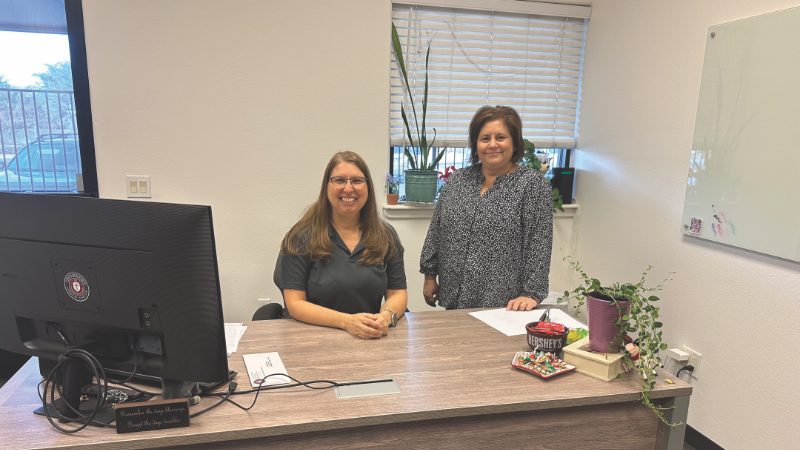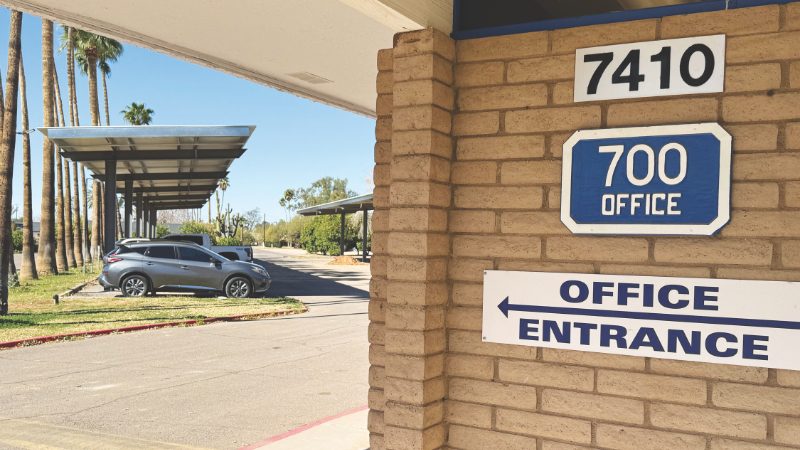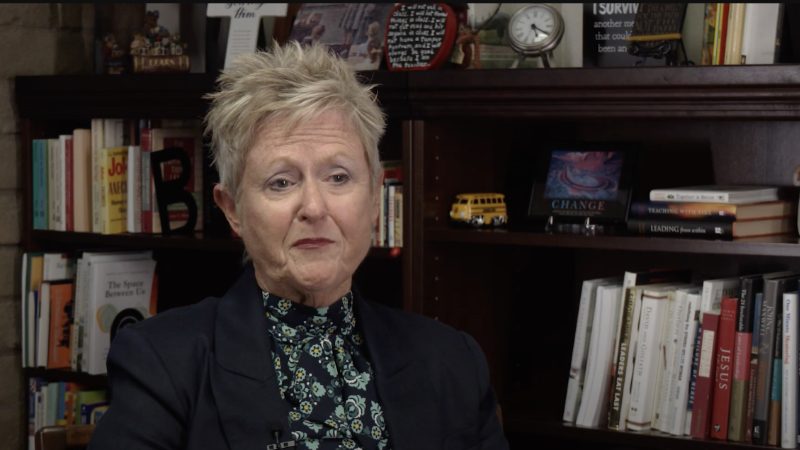On a Sabbath afternoon in June 2021, shortly after being diagnosed with esophageal cancer, my dad said, “This is not a death sentence.” He believed he would overcome it: “I’m going to kick this thing, don’t you worry.” Despite his words, I couldn’t help but imagine the possibility of life without him. Cancer meant a complete shift in life—chemo, radiation, and surgeries. But together, we were determined to fight.
“This is not a death sentence.” My head began to swirl with thoughts—things I had never had to think about before. I had never imagined a future that didn’t involve my dad. But that was a real possibility now. This was one of the only times I ever saw my dad cry. Esophageal cancer meant he had a tumor in his esophagus—his throat essentially. Every time he ate, it would pass by that tumor; his diet became life or death. Cancer meant an entirely different life. Cancer meant chemo and radiation. But we were going to beat this thing.
In John 11, Mary and Martha faced similar fears. Their brother, Lazarus, a close friend of Jesus, was gravely ill. They sent a message to Jesus, saying, “Lord, the one you love is sick” (John 11: 3).1 I could relate deeply to this cry for help, praying through my own fears: “Lord, the one you love is sick. My dad is sick. Don’t let him go.”
Over the months, my dad’s treatments were intense, and in October, he underwent surgery. When the doctors opened him up, there was no tumor—it had disappeared. The surgery was a success, and he went into recovery, feeling healthier than he had in years. We praised God, and for the next 11 months, my dad grew closer to Him, spending hours reading the Bible.
Then, in September, I got a call: the cancer had returned, spreading throughout his body. With a heavy heart, I prayed, “God, you have to heal him.” Yet, he continued to weaken, and on January 30, my mom called, saying, “Honey, I think you need to come home.”
Everyone was there—my aunts, my uncles, my cousin. Everyone that needed to see my dad was there. We prayed hard. I don’t think I’ve ever spent so much time on my knees in my life. I spent the whole day Wednesday and Thursday morning with my dad. We talked about school, my friends, my crushes. I did most of the talking since he was very weak. We watched some old dumb movies together, and when there wasn’t anything good on the oldies’ channels anymore, I flipped through until I found “13 going on 30.”
My dad hated rom-coms, but this time he watched with me. And he laughed. “I don’t know when your dad got to be so old, Melissa,” he said. “I want to be there for you. I want to see you get married and have kids, but I’m afraid that won’t happen now.”
“It's OK,” I assured him. “It’s OK.”
Helping my father sit up in bed was surreal, and calling nurses to lift him felt even stranger. On Thursday morning, I swapped shifts with my mom, said goodbye, hugged my dad, and he squeezed my hand, saying, “I love you.” The plan was to go home, rest, and return. But while I was waiting for my aunt to take me back, my mom walked in. Confused, I wondered why she was there. Through tears, she told my brother, “He didn’t suffer.” I collapsed in grief—my dad was gone.
As I process my loss, I don’t pretend my faith is perfect, but I know Jesus hasn’t left me.
In John 11, when Jesus finally arrived at Bethany, He learned that Lazarus had been dead for four days. Martha met Him, and in her grief, she said, “Lord, if you had been here, my brother would not have died” (verse 21). This is a complex statement—part faith, part sorrow, part question. Jesus could have come sooner, yet He waited. Martha was brave in voicing her disappointment, holding on to faith but also expressing her pain. This resonated with me; I, too, wondered where Jesus was. I had prayed for my dad’s healing, yet he passed away.
Grief is complex, and I thought I’d processed mine. But months later, I realized I felt abandoned by God, questioning His love. I prayed cautiously, relying on my own strength, afraid to trust Him completely. Have you ever felt like that—where God doesn’t seem to answer when you need Him most?
Martha, Mary, and Jesus arrived at Lazarus’ tomb, where we witness the profound moment of “Jesus wept.” Knowing He would raise Lazarus, Jesus still grieved with them. He wept with those He loved, showing that tears do not indicate a lack of faith. In my suffering, I felt Jesus beside me, sharing my pain.
The Seventh-day Adventist Church teaches that the dead are resting, unaware of time passing until the resurrection. Knowing this, I realize Jesus misses my dad even more than I do. The Holy Spirit can no longer comfort my dad directly while he rests in death, so Jesus grieves this separation, too.
As I process my loss, I don’t pretend my faith is perfect, but I know Jesus hasn’t left me. Grief can make us feel isolated, but we aren’t alone. Jesus is with us even in the darkest times, and His presence offers comfort. Loss can shake us, yet it brings us closer to Jesus, the “pioneer and perfecter of faith” (Hebrews 12:2).
Grief extends beyond death; it encompasses any loss, whether it’s a relationship, a job, or a dream. We were created for eternity, and grief is a painful reminder that this world is not as it should be. K.J. Ramsey, in This Too Shall Last, writes, “We grieve because we have seen flashes of the beauty and joy and pure love of the kingdom of God. And we ache for it to come.”2
Whatever you have lost, grieve it. Maybe you’ve lost a parent as I have, a sibling, a job, the family you wanted, the life you wanted to have. Grieve that loss. Know that grieving is not a sign of a lack of faith. I am not the one who must summon up faith when I am weak. I do not have to pull myself up. Jesus is the pioneer, the author, and perfecter of my faith. Of your faith. He knows suffering, He died on a cross bearing the weight of all our sins, and He is now seated at the right hand of God. And He gives me grace that sustains me through every day.
My dad told me just before he died (through a text because he couldn’t talk well), “Let this drive you closer to Jesus, rely on Him to get through.” This is my prayer for you today, whatever you are grieving: Let it pull you closer to Jesus. Fix your eyes on Jesus, the One who knows your pain more intimately than anyone.

_____________________________
Melissa Maguire is a senior theology student at Southern Adventist University. She is currently serving as a taskforce worker at Fletcher Academy as the assistant girls' dean before she graduates in May 2026. Her home is in Phoenix, Arizona.
1 All Scripture quotations are from the New International Version.
2 K.J. Ramsey, This Too Shall Last: Finding Grace When Suffering Lingers (Grand Rapids, MI: Zondervan, 2020), p. 193.
«Esta no es una sentencia de muerte»
Por Melissa Maguire
Un sábado por la tarde en junio de 2021, poco después de ser diagnosticado con cáncer del esófago, mi padre dijo: «Esta no es una sentencia de muerte». Creía que lo superaría: «Voy a vencer esta cosa, no te preocupes». A pesar de sus palabras, no pude evitar imaginar la posibilidad de vivir sin él. El cáncer significó un cambio completo en la vida: quimioterapia, radiación y cirugías. Pero juntos, estábamos decididos a luchar.
«Esta no es una sentencia de muerte». Mi cabeza comenzó a dar vueltas con pensamientos, cosas en las que nunca antes había tenido que pensar. Nunca había imaginado un futuro que no involucrara a mi papá. Pero ahora era una posibilidad real. Esta fue una de las pocas veces que vi llorar a mi papá. El cáncer del esófago significaba que tenía un tumor en el esófago, esencialmente en la garganta. Cada vez que comía, pasaba por ese tumor; su dieta se convirtió en vida o muerte. El cáncer significaba una vida completamente diferente. El cáncer significaba quimioterapia y radiación. Pero íbamos a vencer a esa cosa.
En Juan 11, María y Marta enfrentaron temores similares. Su hermano, Lázaro, un amigo cercano de Jesús, estaba gravemente enfermo. Enviaron un mensaje a Jesús, diciendo: «Señor, aquel a quien amas está enfermo» (Juan 11:3). Podía identificarme profundamente con ese grito de ayuda, orando a través de mis temores: «Señor, la persona que amas está enferma. Mi papá está enfermo. No lo dejes ir».
A lo largo de los meses, los tratamientos de mi papá fueron intensos y en octubre se sometió a una cirugía. Cuando los médicos lo abrieron, no había ningún tumor, había desaparecido. La cirugía fue un éxito y entró en recuperación, sintiéndose más saludable de lo que se había sido en años. Alabamos a Dios, y durante los siguientes 11 meses, mi papá se acercó más a él, pasando horas leyendo la Biblia.
Después, en septiembre, recibí una llamada: el cáncer había regresado y se había extendido por todo su cuerpo. Con el corazón apesadumbrado, oré: «Dios, tienes que sanarlo». Sin embargo, continuó debilitándose, y el 30 de enero, mi mamá me llamó y me dijo: «Cariño, creo que necesitas volver a casa».
Todo el mundo estaba allí: mis tías, mis tíos, mi primo. Todos los que necesitaban ver a mi papá estaban allí. Oramos mucho. Creo que nunca en mi vida he pasado tanto tiempo de rodillas. Pasé todo el miércoles y el jueves por la mañana con mi papá. Hablamos de la escuela, de mis amigos, de mis enamorados. Hablé la mayor parte del tiempo, ya que él estaba muy débil. Vimos algunas películas viejas y bobas juntos, y cuando ya no había nada bueno en los canales de los programas viejos, busqué hasta que encontré «13 going on 30».
Mi papá odiaba las comedias románticas, pero esta vez la vio conmigo. Y se echó a reír. «No sé cuándo tu papá llegó a ser tan viejo, Melissa», medijo. «Quiero estar ahí para ti. Quiero ver casarte y tener hijos, pero me temo que eso no sucederá ahora».
«Está bien», le aseguré. «Está bien».
Ayudar a mi padre a sentarse en la cama era surrealista y llamar a las enfermeras para que lo levantaran me parecía aún más extraño. El jueves por la mañana, cambié turnos con mi mamá, me despedí, abracé a mi papá y él me apretó la mano y me dijo: «Te amo». El plan era volver a casa, descansar y regresar. Pero mientras esperaba que mi tía me llevara de regreso, mi mamá entró. Confundida, le pregunté por qué estaba allí. Entre lágrimas, le dijo a mi hermano: «Él no sufrió». Me derrumbé de dolor: mi papá se había ido.
Mientras proceso mi pérdida, no pretendo que mi fe sea perfecta, pero sé que Jesús no me ha abandonado.
En Juan 11, cuando Jesús finalmente llegó a Betania, se enteró de que Lázaro había estado muerto durante cuatro días. Marta se encontró con él y, en su dolor, le dijo: «Señor, si hubieras estado aquí, mi hermano no habría muerto» (versículo 21). Esa es una declaración compleja, en parte fe, en parte tristeza, en parte pregunta. Jesús pudo haber venido antes, pero esperó. Marta fue valiente al expresar su decepción, aferrándose a la fe, pero también expresando su dolor. Eso resonó en mí; yo también me preguntaba dónde estaría Jesús. Había orado por la sanidad de mi padre, pero falleció.
El duelo es complejo y pensé que había procesado el mío. Pero ,meses después, me di cuenta de que me sentía abandonada por Dios, cuestionando su amor. Oré con cautela, confiando en mis propias fuerzas, temerosa de confiar completamente en él. ¿Alguna vez te has sentido así, donde Dios no parece responder cuando más lo necesitas?
Marta, María y Jesús llegaron a la tumba de Lázaro, donde asistimos al momento profundo de «Jesús lloró». Sabiendo que resucitaría a Lázaro, Jesús todavía se afligía con ellas. Lloró con aquellas a quienes amaba, mostrando que las lágrimas no indican falta de fe. En mi sufrimiento, sentí a Jesús a mi lado, compartiendo mi dolor.
La Iglesia Adventista del Séptimo Día enseña que los muertos están descansando, sin darse cuenta del tiempo que pasa hasta la resurrección. Sabiendo eso, me doy cuenta de que Jesús extraña a mi papá incluso más que yo. El Espíritu Santo ya no puede consolar a mi papá directamente mientras descansa en la muerte, por lo que Jesús también lamenta esa separación.
Mientras proceso mi pérdida, no pretendo que mi fe sea perfecta, pero sé que Jesús no me ha abandonado. El dolor puede hacer que nos sintamos aislados, pero no estamos solos. Jesús está con nosotros incluso en los momentos más oscuros y su presencia ofrece consuelo. La pérdida puede sacudirnos, pero nos acerca a Jesús, el «pionero y consumador de la fe» (Hebreos 12:2).
El dolor se extiende más allá de la muerte; Abarca cualquier pérdida, ya sea una relación, un trabajo o un sueño. Fuimos creados para la eternidad y el dolor es un duro recordatorio de que este mundo no es como debería ser. K.J. Ramsey, en This Too Shall Last, escribe: «Nos afligimos porque hemos visto destellos de la belleza, el gozo y el amor puro del reino de Dios. Y anhelamos que llegue».1
Lo que sea que hayas perdido, aflígete. Tal vez hayas perdido a un padre como yo, un hermano, un trabajo, la familia que querías, la vida que querías tener. Lamenta esa pérdida. Sabe que el duelo no es una señal de falta de fe. No soy yo quien debe echar mano de la fe cuando soy débil. No tengo que hacer un esfuerzo. Jesús es el pionero, el autor y el perfeccionador de mi fe. De tu fe. Él conoce el sufrimiento, murió en una cruz llevando el peso de todos nuestros pecados, y ahora está sentado a la diestra de Dios. Y él me da una gracia que me sostiene cada día.
Mi papá me dijo justo antes de morir (a través de un mensaje de texto porque no podía hablar bien): «Deja que esto te acerque más a Jesús, confía en él para salir adelante». Esa es mi oración por ti hoy, sea lo que sea por lo que estés afligido: deja que te acerque más a Jesús. Fija tus ojos en Jesús, aquel que conoce tu dolor más íntimamente que nadie.

_____________________________
Melissa Maguire es estudiante de último año de teología en Southern Adventist University. Actualmente se desempeña como trabajadora del grupo de trabajo en Fletcher Academy como preceptora asistente de chicas antes de graduarse en mayo de 2026. Vive en Phoenix, Arizona.
2 K.J. Ramsey, This Too Shall Last: Finding Grace When Suffering Lingers (Grand Rapids, MI: Zondervan, 2020), p. 193.





